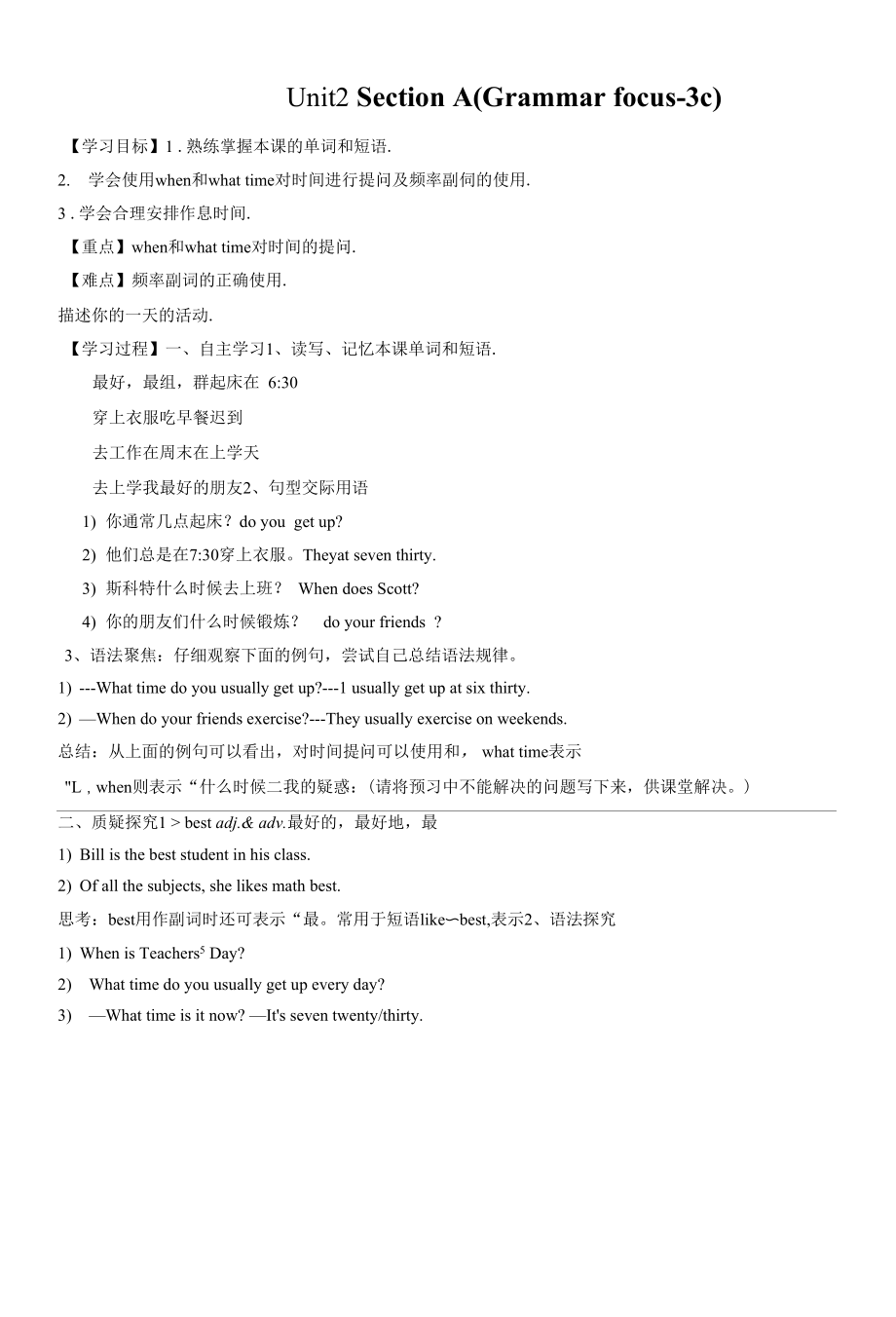《Unit2 Section A(Grammar focus-3c)導(dǎo)學(xué)案- 人教新目標(biāo)七年級(jí)英語下冊(cè).docx》由會(huì)員分享�,可在線閱讀�,更多相關(guān)《Unit2 Section A(Grammar focus-3c)導(dǎo)學(xué)案- 人教新目標(biāo)七年級(jí)英語下冊(cè).docx(3頁珍藏版)》請(qǐng)?jiān)谘b配圖網(wǎng)上搜索。
1���、Unit2 Section A(Grammar focus-3c)
【學(xué)習(xí)目標(biāo)】1 .熟練掌握本課的單詞和短語.
2. 學(xué)會(huì)使用when和what time對(duì)時(shí)間進(jìn)行提問及頻率副伺的使用.
3 .學(xué)會(huì)合理安排作息時(shí)間.
【重點(diǎn)】when和what time對(duì)時(shí)間的提問.
【難點(diǎn)】頻率副詞的正確使用.
描述你的一天的活動(dòng).
【學(xué)習(xí)過程】一����、自主學(xué)習(xí)1�����、讀寫�����、記憶本課單詞和短語.
最好�,最組���,群起床在 6:30
穿上衣服吃早餐遲到
去工作在周末在上學(xué)天
去上學(xué)我最好的朋友2�、句型交際用語
1) 你通常幾點(diǎn)起床����?do you get up?
2) 他們總是在7:30穿上衣
2���、服。Theyat seven thirty.
3) 斯科特什么時(shí)候去上班�? When does Scott?
4) 你的朋友們什么時(shí)候鍛煉? do your friends ?
3�、語法聚焦:仔細(xì)觀察下面的例句,嘗試自己總結(jié)語法規(guī)律���。
1) ---What time do you usually get up?---1 usually get up at six thirty.
2) —When do your friends exercise?---They usually exercise on weekends.
總結(jié):從上面的例句可以看出�,對(duì)時(shí)間提問可以使用和�, wha
3、t time表示
"L����,when則表示“什么時(shí)候二我的疑惑:(請(qǐng)將預(yù)習(xí)中不能解決的問題寫下來,供課堂解決����。)
二、質(zhì)疑探究1 > best adj.& adv.最好的�����,最好地,最
1) Bill is the best student in his class.
2) Of all the subjects, she likes math best.
思考:best用作副詞時(shí)還可表示“最����。常用于短語like?best,表示2、語法探究
1) When is Teachers5 Day?
2) What time do you usually get up every day?
4���、3) —What time is it now? —It's seven twenty/thirty.
思考:1)本單元主要介紹了 when和what time引導(dǎo)的特殊疑問句���。when和what time都可以詢問,表示“什么時(shí)候”和“幾點(diǎn)二不同之處在于可以詢問范圍較大的時(shí)間�,也可
詢問確切的時(shí)間(但一般不用于提問“兒點(diǎn)了”); 只能用于詢問確切的時(shí)間��,不用于詢問范圍較大的時(shí)間�。上面的三個(gè)例句中��,例句1)中的(能
/不能)換成what time,例句2)中的what time (能/不能)換成when,例句3)中的what time
(能/不能)換成wheno2)英語中表達(dá)時(shí)間可以
5����、用數(shù)字排列法,整點(diǎn)時(shí)間表示為" +o��,clock”���,有時(shí)o'clock也可以省
略����;非整點(diǎn)數(shù)直接用數(shù)字并列,即“鐘點(diǎn)數(shù)+”�����。如:7:20==seven twenty;8:30==eight thirty等�。
總結(jié):(學(xué)習(xí)建議:回顧本節(jié)課的內(nèi)容,從課文理解和長(zhǎng)難句分析方面進(jìn)行二次領(lǐng)會(huì)和記憶��。)【當(dāng)堂檢測(cè)】
(-)選擇填空:
【當(dāng)堂檢測(cè)】
(-)選擇填空:
1. The bus usually
at six forty-five in the
morning.
A. comeB. comes
C. coming
D. to come
2.1 usually go
6�����、 to school
seven o'clock..
A. atB. in
C. onD. for
3.That's a funny time
—breakfast.
A. atB. to C. for
D. on
A. work B. works C. job D. jobs
9. 一 Do you brush your after dinner every
day?
A. tooth B. toothes C. tooths D. teeth
(二)句型轉(zhuǎn)換:
4. ― is your birthday? -My birthday is
on Sept
7��、ember 5th.
A. When B. What C. What time D. How
5. — Whafs the time? ―nine-fifteen.
1. Jane gets 叩 at 7 o'clock every day.(對(duì)劃線部分 提問)
Jane every day?
2. does, what, she, home, go, usually, time (連詞成 句)
A. The time is
B. It's C. At D. This is
6. —
is it today? — It's Wednesday.
A. What tim
8�、e
B. What day C. When
D. How
7.--
? - At 6:30 am.
9
.
3. He has lunch at school at 12:00.(對(duì)劃線部分提
問)
he lunch at 12:00?
4. When does your father go to work?(變同義句)
does your father go to work?
5. People usually eats dinner in the evening.(改?昔)
A. What's the timenow? B. What time do you go toschool?
C. Do you go to school at 6:30? D. When do you go to bed?
8. 一 Why aren't you happy? — Because I can't find
 Unit2 Section A(Grammar focus-3c)導(dǎo)學(xué)案- 人教新目標(biāo)七年級(jí)英語下冊(cè).docx
Unit2 Section A(Grammar focus-3c)導(dǎo)學(xué)案- 人教新目標(biāo)七年級(jí)英語下冊(cè).docx

